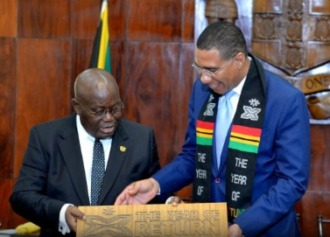KINGSTON, Jamaica – The Bank of Jamaica posted on its website Feb. 15 an International Monetary Fund press release with the caption, “IMF and Jamaica authorities reach staff-level agreement on key elements of the EFF-Supported programme.”
This is the first of two steps in the approval process; Next is approval by the IMF board that should take place by the end of March.
This means that Jamaica will be able to draw down US$750 million, 175 percent of the amount to which it is entitled. It also means that Jamaica will be able to receive loans and grants from other multilateral and bilateral sources.
That is, however, as good as it gets. What this loans means is that Jamaica will be able to kick the can down the road. It does not mean that, as a nation, we will fundamentally break with the cycle of poverty, low rates of economic growth, and indebtedness that has been our lot for more than three decades.
When the government of the Jamaica Labour Party re-entered a borrowing arrangement with the IMF in 2008, one of the antecedent required actions was the Jamaica Debt Exchange. JDX meant that for the first time in its history, Jamaica defaulted on a credit arrangement.
A National Debt Exchange (NDX), like the JDX, was an antecedent to the 2013 IMF agreement. Those who have been close to the negotiations have indicated that the NDX is the lesser evil. The IMF had insisted on a 25 percent default on principal on local debt.
It has to be clearly understood that this anticipated IMF agreement is nothing but bridge financing. The real challenge is to grow business by expanding production in the Jamaican economy. This is a truism.
What we do not know is whether there are any available and viable options remaining to grow the Jamaican economy.
The major markets of the North Atlantic, Europe and America are less than robust at this time. The most cynical among us believe that capitalism, including crony capitalism, is in irrecoverable precipitous decline.
WHAT DOES SOVEREIGNTY MEAN FOR JAMAICA?
The grand announcement of an IMF deal and its prior actions raises the important question of the meaning of sovereignty for Jamaica. Are we truly an independent nation? And in what sense are we in charge of our affairs? The order paper presented by the IMF team to Jamaica, with the list of requirements in 2012-13, is exactly the same as the one presented to the previous administration in 2008. In fact, those who have seen the order paper tell me that the date on the document was 2008.
In 2008, the IMF presented the Jamaican government with a list of conditions. It, however, advanced loan funds in the sum of US$1.2 billion. The government received the funds, but ignored and abandoned the conditions. In addition to the heavy injection of IMF money, there was the fiscal space created by the JDX that amounted to J$42 billion per year.
Read more: Garnett Roper, Jamaica-Gleaner


